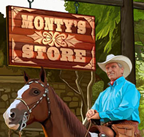I was hoping someone could help me with any advise about feeding in this snow!
My horse chip ( 16hh ex-racehorse) has developed different behavior. When ever i bring the hay to feed him in his field he puts his ears back back, whinnies, and follows closely behind me. So far he isn't aggressive, eg no biting ect, but i was wondering if this is bad behavior, or is he hungry!?!? He gets hay and feed twice a day, but i dont want him to think he is the dominate animal. Please help, how should i approach this behavior in a calm an non violent way?
← back
The Listening Lounge
HELP!! snow

Rewards
Subscribe to Equus Online University and become a part of Monty's worldwide mission to leave the world a better place for horses and for people too.
Students automatically gain access to special rewards, such as exclusive discounts at the Monty Roberts Online Shop. Visit Monty Roberts Online Shop.



Hi Louise. I'm no expert but I would imagine that if he is only acting like this now whilst there is snow the chances are that he is hungry. I know that my mare is very dominant (not with people) so she chases the other horses away from any feed in the field. To combat this I throw one small ammount of hay per horse into the field over the fence. Whilst they are munching on this I can take the remaining hay into the field safely without the worry of horses chasing each other around me. If you only have one horse and he is behaving like this towards you I would suggest that you first of all catch him and tie him up in a safe place with a small ammount of hay. Then you can safely put the rest of the hay into his field. Once you have done all you need to do in the field fetch him and take him back to the gate with you. Then release him near the gate so that you are safely out of the field whilst he is loose. I would suggest that you weigh his hay and make sure that you are feeding him enough each day. I don't weigh mine but do make sure that I put enough out so that there is still some left the next day when I go to feed. My Mare is 16.2 ISH and is having about 2/3 to 3/4 of a small bale of hay every day whilst it is snowy along with a good hard feed. Hope this helps! Beth
Thanks so much, i will try this :) Have given him the amount you suggested and it seems to have worked so far! Thankyou again :)
Louise
I was under the impression that hay actually increases the body temperature to warm the horse in the cold, specially snowy days. Never experienced it myself but have even heard that about 20-30 minutes of feeding hay, if cold enough, one will see the heat coming off the horse's back, in other words, increasing the body temperature to heat up the animal. With that said, it would be reasonable to say that beejam's assumption of your horse being hungry is accurate because so much of what is fed goes to heat him up. If true, then I'd have to think that the amount of hay needs to be DECREASED as the weather changes.
When it is cold you definately need to feed more, the animals need more energy to keep warm,they will burn way more calories/day when it is cold just keeping the body functions going. They are going to need way more energy when it is -35 C than when it is around 0. And yes you can cut back the feed when it warms up, but for the most part, the horse won't eat as much when it warms up as when it is cold, and you will be cutting back anyway to avoid so much wastage/spoilage. I really notice it here in western Canada, that the feed usage really swings along with the temperature. It makes it hard when trying to budget for feed purchases, but it is something those of us in cold climates have grown used to I suppose.
Yes, I definitely decrease the hay as the weather warms up. Once the snow has thawed I find that mine tend to eat a lot less hay as they 'browse' more on the grass and I believe that it is true that feeding hay warms the horse so they are likely to eat less once the temperature rises. I'm glad it's not as cold here in the UK as it is in Canada! We are having a nightmare here and we've only had snow for a couple of weeks and lowest temperature where I live has been around -8 C. We just aren't equipped for cold weather in this country!
Beejam:
Our first snow came the start of November, about 2 weeks later than normal, but it also got cold at the same time. We have had pretty much straight -30 C weather since, we have had wind chill factors into the low - 40's. It broke here the last couple of days and gave us a little reprieve. It has been right around 0 in the day and down to about -15 C at night and is supposed to be like this for the next few days until it gets cold again. On the down side with the extreme cold we don't get that much snow and only have maybe, a few inches on the level. We need quite a bit more as it was pretty dry here the last year and all the dug outs and other water holes have dried up in our pasture. I wish we were getting some of the snow you have been getting in the UK!! Too bad all that water you will get in the snow will run off into the ocean, you need to send some our way :)
Beetle:
How do you keep your horses watered in those temperatures?! and how do you cope driving? Our country seems to come to a stand still with just a couple of heavy snow falls and a few weeks of cold weather!
Our vehicles have block heaters to keep the engine warm so that it starts easier in the cold, we don't travel much in the extreme cold. We get our mail at the local town and where our kids go to school, about 25 miles away, and our larger center with health care facilities and decent shopping is about 65 miles away. You just make sure you only go when you absolutely have to. Most vehicles in our area are 4 wheel drives and have pretty decent clearance as well. Besides, its not the cold that is the problem, its the wind and the storms. You just don't go anywhere in bad weather unless its an emergency.
We run quite a few brood mare, over 40, and 4 studs. In years when we get snow they run about 4 sections (studs seperate from the mares but they run together) in the hills and grass, we no natural trees here. When they run the hills they eat snow and forage for grass, we feed them only when the temp really drops and they do quite well. In years like this we have them in the yard and feed regularily and they have access to waterers that are heated to prevent freezing. I know that the range running of the horses may seem odd to you in the UK, but if you think about it, where do the wild horses of northern Saskatchewan, Western Alberta, and the North West USA get their water? They don't have water bowls, they eat snow. You do have to make sure that if a chinook comes through and ices over the snow you have to pull them from their range as the ice will cut their feet and legs as they paw, but if the weather holds and the snow is good they do really quite well on the pasture for the winter. We also find that we get less dystocia problems as the mares are in better shape and have had exercise throughout the winter. No such luck this year though, high feed costs and electrical bills this year.
Hi there ! seems like the snow is a big thing to talk about these days. Germany is covered with snow too and a week ago we had "Daisy" which brought tons of snow and live to a stop. The situation for the horses I deal with is much more like your's beejam, a part of them are outside 24/7 and another part is in the paddocks during the day and in the stable in the night. There is another point I find interesting to discuss: blankets. I realized that the colder it became more horses both, always outside and night-stable, get a blanket. I learned that horses mainly look for shelter if they become wet and cold because of cold wind at the same time. The 24/7 herds have covered feeding spots and open stables but for some hours a day (not every day) they are closed off that area if it is cleaned up. During this time I found the mare I care for standing their shiver with cold. I brushed her, walked her, fed her and she was fine again. We noticed that compared with the other horses she had produced much less winter coat. Her owner said, that the former years she has had much more (which was in a nother place). So, as we cannot see her every day to check on her, we decided to put a blanket on her, a light one just with some fleeze inside to prevent she catches a cough etc. Well, I admit thinking of her when the temperature falls to -10°C and knowing she has got that blanket on gives me a good feeling on the other hand I would prefer to let her figure out the cold herself, knowing that she is far up in the hirachy and would - if not closed off - always find enough food and shelter... I guess I will put the blanket off as soon as the temperature rises constantly over 0°C - or is it too late now and she is too much used to the warm blanket to get used to the cold ? There is another interisting thing I would like to tell, it's about silage + blanket = swolen hind legs, but for the moment I must go. Have a great weekend and stay in touch ! Vio Berlin
Well, I have to tell you that I am letting my horse winter in the pasture this year in Saskatchewan and I would prefer for it to be a normal -25 C winter than this warm one. At -25 C temperatures, my horse loves the hay on demand (round bale), drinks from his heated water bowl, and pretty much cozies up to his buddies in the shelter. (By the way, he has no blanket because the blanket will flatten his coat and actually make him colder. And, in a pasture setting, horse playing may rip his rug and wind it around his feet or neck.) I find with this warm winter now, highs of +3, he is eating less and horse playing more and I am seeing the bite marks already on his hind quarters (hope the judges won't mind) - but his feet and mind are awesome. I love reading how everyone winters their horses in their part of the world.
I'm like you EvyG... I fed my first bale when the temps reached -40C. Before that my horses were perfectly happy out in the back fields pawing. None of them have blankets on, and even in the -40 none of them shivered. They do have a heated water trough but rarely drink out of it because they just eat snow. I feed their hay by the trough so that they have plently of water while eating dry hay. I will never again just give my horses a bale though... Even if it is good quality horse hay, there is still dust in them. My horses have the tendency to just stand there and eat out of the same hole, burying their faces in the bale. They suck all of that dust up into their lungs. I have more peace of mind if I just roll the bale out on the ground. This gives them somewhere to bed as well. I know it sounds like you'd waste more hay, but I make them clean it up fairly well before I put another bale out.
It is really interesting hearing how everyone copes in the winter with varying temperatures and how much I now feel that I 'spoil' my horses too much!!
I must admit that both of my big horses have blankets. I must be soft!! I have 3 blankets for both of them! A 'rain sheet' with no fill, a medium and a thick with a neck. They're wearing the thick with neck at the moment. They will probably wear this thick one until end Feb then I'll put the medium one on, then the thin one march time and then I'll take them off totally around April. I have a Welsh Mountain Pony who wears no blankets as she grows a big thick coat like a teddy bear!
Mine all live out 24/7 with trees for shelter. The field has a valley so they can get shelter down the bottom of the valley under the trees. I prefer them to live out as I don't like the thought of shutting them inside stables unless they are unwell or something. Stables are useful for training too so I'd like to have some but at the moment I just manage with a round pen made from wooden posts and thick white tape. It seems to do the trick.
I always spread the hay out in the field rather than put it in one big pile. I think it is better to do this as the horses are forced to move about the field to find the piles of hay rather than stand in one place.
Hey C.Grant. That was my concern and still is with the round bale. But I border out my horse..I do not have a place to keep him as I would like. So far, no heaves. I keep my fingers crossed. I actually thought my horse would stand there and dig his head in too...but I think he is still a colt at heart and loves to play. He is actually not getting as fat as I thought he would get this winter. But you others note, that where I live, after my last show in September, my horse does not have a blanket on so he can develop a winter coat for warmth. If I did not allow him to do this, for sure I would blanket him.
In the SF Bay Area, we have deep, gross, sticky mud when it rains and dusty hardpack when it doesn't. That pretty much covers it!
i loved reading all these stories in the uk we are a country who love horse fashion horses should only be turned out in the seasons new colours and of course the more expensive the rug the better horse owner you are!! people here love there horses to be stabled from sept to may boxes must have thick cosey beds horses should have three blankets and a duvet legs bandages are also good for keeping there little leggies warm this is not all of us so i appologise to those who dont do this my horses live out all year and the more dirt they are coverd in the better
This is all quite interesting.
I see lots of people talking as if no one works there horses when it get below freezing. Feeding has a lot to do with the weather and the work. We get way below freezing here and my guy likes to work in the cold. He enjoy working in the snow as much as the soft dirt.
If anyone works their horse in below freezing temperatures what method do you use to cool down when you are done. With such short daylight hours surely you get caught cooling down after the cold damp air rolls in.